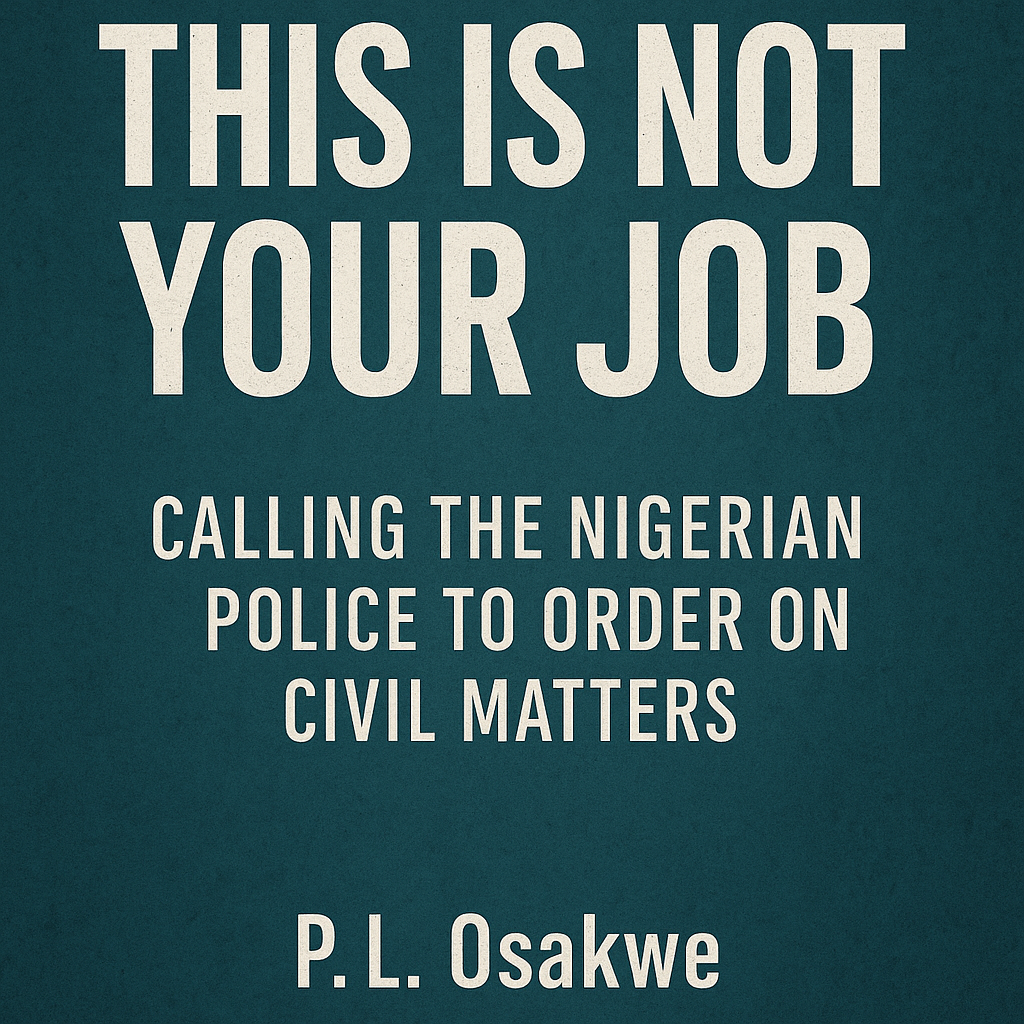By: P.L. Osakwe
“A police force that cannot tell the difference between a breach of peace and a breach of contract becomes a threat to democracy.”
I. Introduction: When the Police Become the Problem
In Nigeria today, an increasing number of citizens have come to fear the police, not because they are criminals, but because civil disagreements now end in handcuffs. Landlord and tenant disputes. Debt recovery. Family quarrels. Business disagreements. Matters that belong in courtrooms are now being dragged into charge rooms.
This article is a direct call to the Nigeria Police Force (NPF) to retrace its steps and respect the limits of its constitutional and statutory powers. The Police Act 2020, the 1999 Constitution (as amended), and judicial precedent are clear: the Nigerian police has no business meddling in civil disputes.
And where they do, they act unlawfully, and should be held to account.
II. The Law Is Clear: The Police Are for Crimes, Not Contracts
Let us begin where all authority must begin—in the law.
Section 4 of the Police Act 2020
“The police shall be employed for the prevention and detection of crime, the apprehension of offenders, the preservation of law and order, and the protection of life and property.”
There is no mention of civil matters. The phrase “crime” here is crucial. Civil wrongs such as debt recovery, tenancy breaches, or contract defaults are not crimes, and thus fall outside police jurisdiction.
Section 6 of the Constitution of the Federal Republic of Nigeria, 1999
Only courts have the power to determine civil rights and obligations. That is the exclusive jurisdiction of the judiciary—not the police. When the police step into civil disputes, they are usurping judicial powers, a grave constitutional sin.
Judicial Pronouncements
In the case of McLaren v. Jennings (2003) 3 NWLR (Pt. 808) 470, the Court of Appeal held that:
"The police have no business in enforcement of contracts or collection of debts or meddling in purely civil disputes."
In Kure v. COP (2020) LPELR-49378(CA), the Court condemned police involvement in a commercial transaction, declaring such intervention illegal and ultra vires.
So what then justifies the police dragging someone to the station over money lent, rent unpaid, or goods not delivered?
III. Abuse in Practice: Arrest as a Weapon
Across Nigeria, individuals now weaponize police officers to intimidate others in civil matters. A tenant is locked up for defaulting on rent. A trader is detained for failing to deliver goods. A former lover is arrested over unpaid loans.
How does this happen?
The usual tactic: a complainant alleges "threat to life" or "fraud" to mislead the police into intervening. Officers, either out of ignorance or personal gain, arrest, extort, and detain.
This abuse of police process violates:
Section 35 of the Constitution (Right to personal liberty),
The Anti-Torture Act 2017, and
The ethical code of the Nigeria Police itself.
IV. The Cost of Illegality: Public Distrust and Institutional Decay
When the police intrude into civil matters, they erode public trust. Citizens lose faith in both the legal system and law enforcement. More dangerously, it fuels corruption, turning police stations into debt recovery agencies for hire.
It also clogs the criminal justice system with non-criminal cases, wasting public resources and denying attention to real crimes—rape, armed robbery, kidnapping, and murder.
This is how a nation fails its people.
V. The Way Forward: Stop, Train, Enforce
1. Stop the Practice
Inspector General of Police, Commissioners, and DPOs must issue strict orders banning officers from intervening in civil disputes.
2. Retrain the Force
Every officer must be trained—retrained if need be—to distinguish civil wrongs from criminal offences. Legal departments in police commands must vet complaints thoroughly before assigning officers.
3. Punish Offenders
Officers who arrest or detain citizens over civil matters must face disciplinary action, including dismissal and prosecution.
4. Citizens Must Resist
Nigerians must know their rights. If you are arrested over a purely civil issue:
Demand the specific offence under Criminal or Penal Code.
Inform your lawyer immediately.
Sue for unlawful arrest and seek damages.
VI. Conclusion: The Law Must Protect the People
The police are not mediators in business. They are not agents of debt collection. They are not enforcers of tenancy agreements. Their badge is not a license to intimidate innocent citizens in the name of resolving civil quarrels.
It is time to remind the police, in bold letters:
This is not your job.
The Nigerian Police must return to its constitutional path, protect rights—not violate them—and leave civil matters to the courts.



